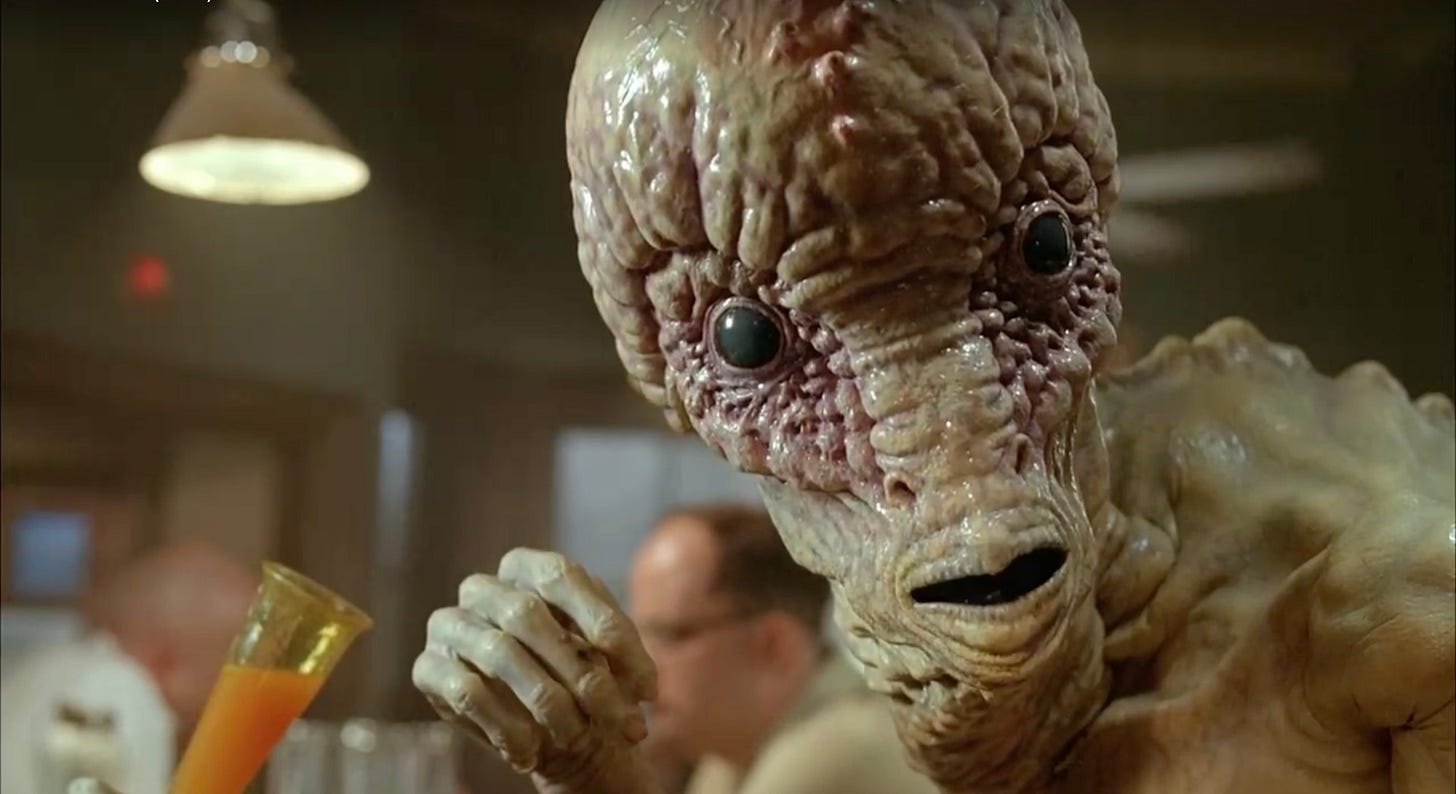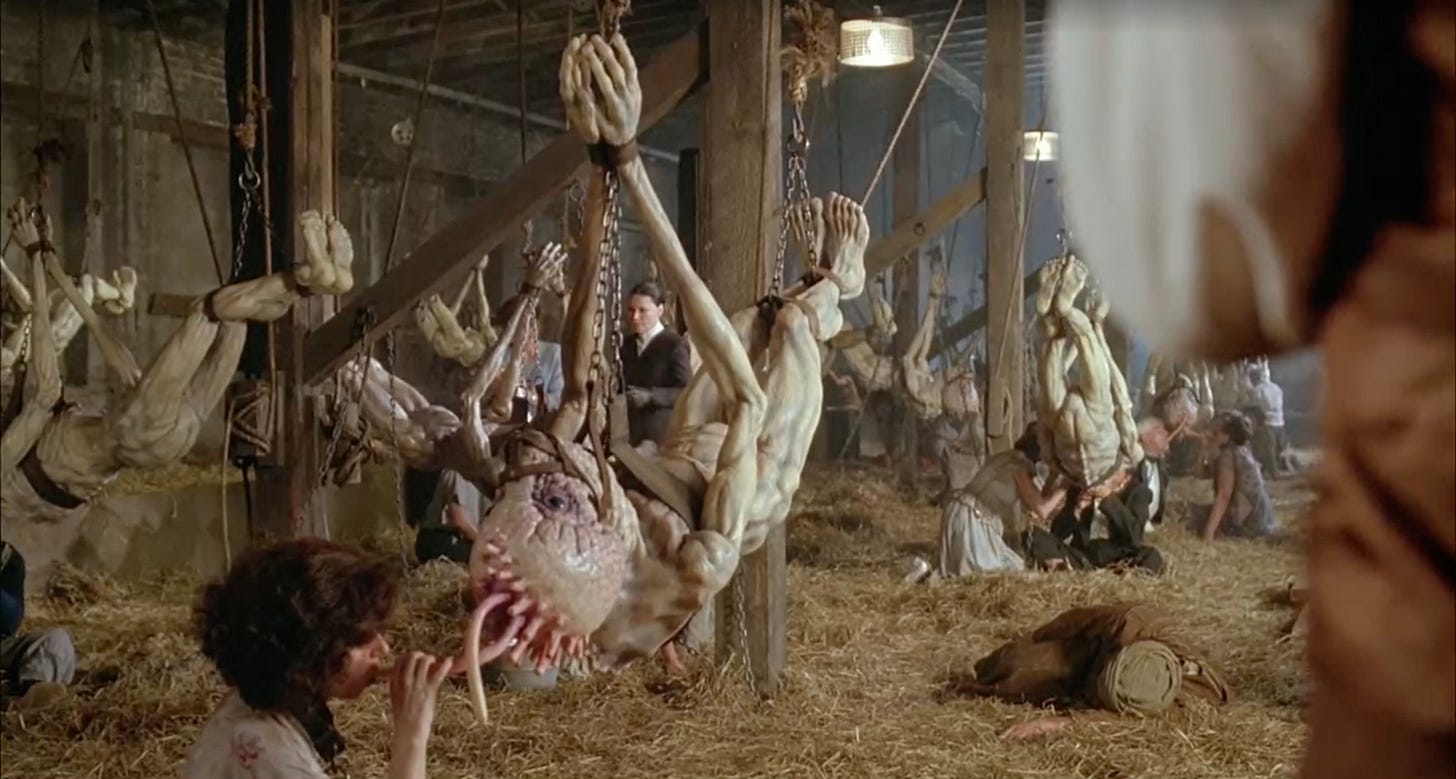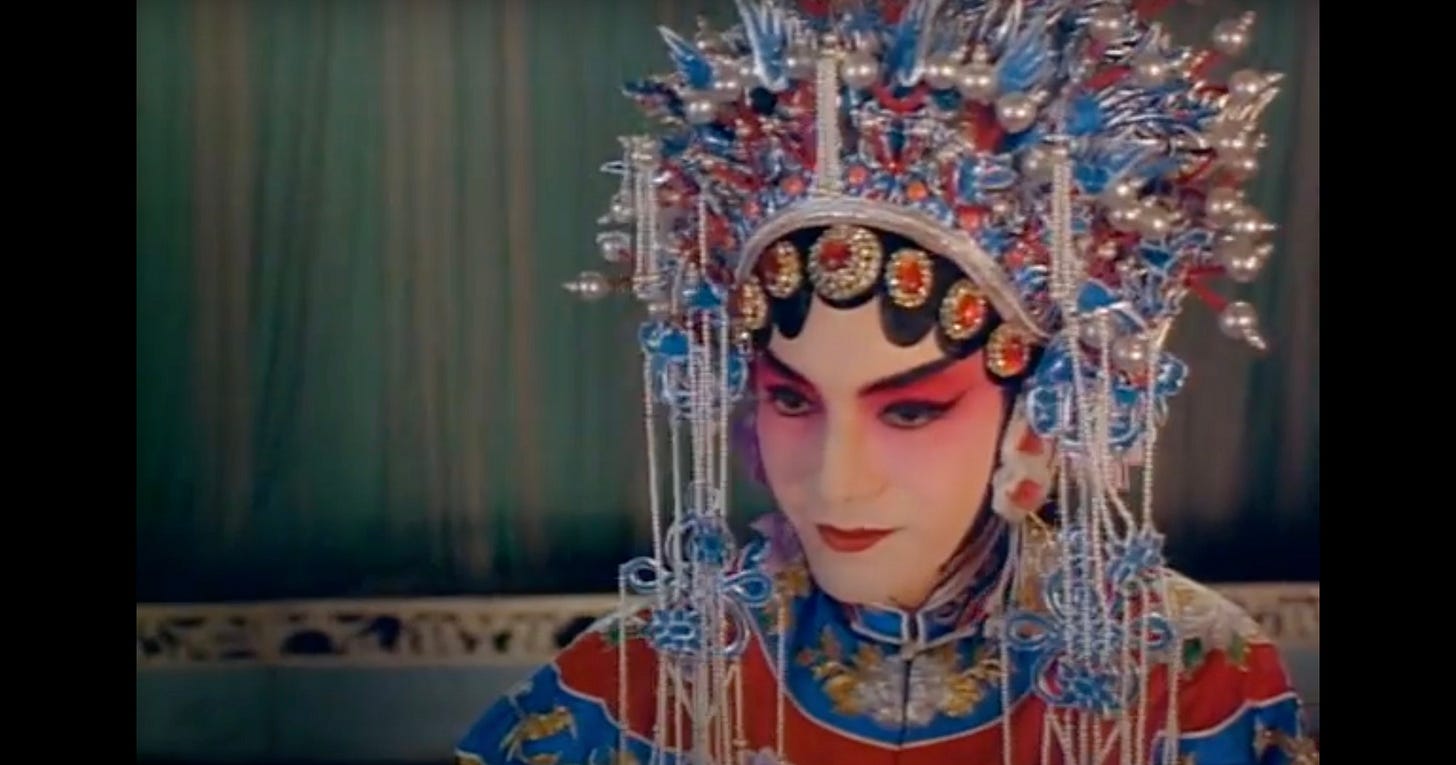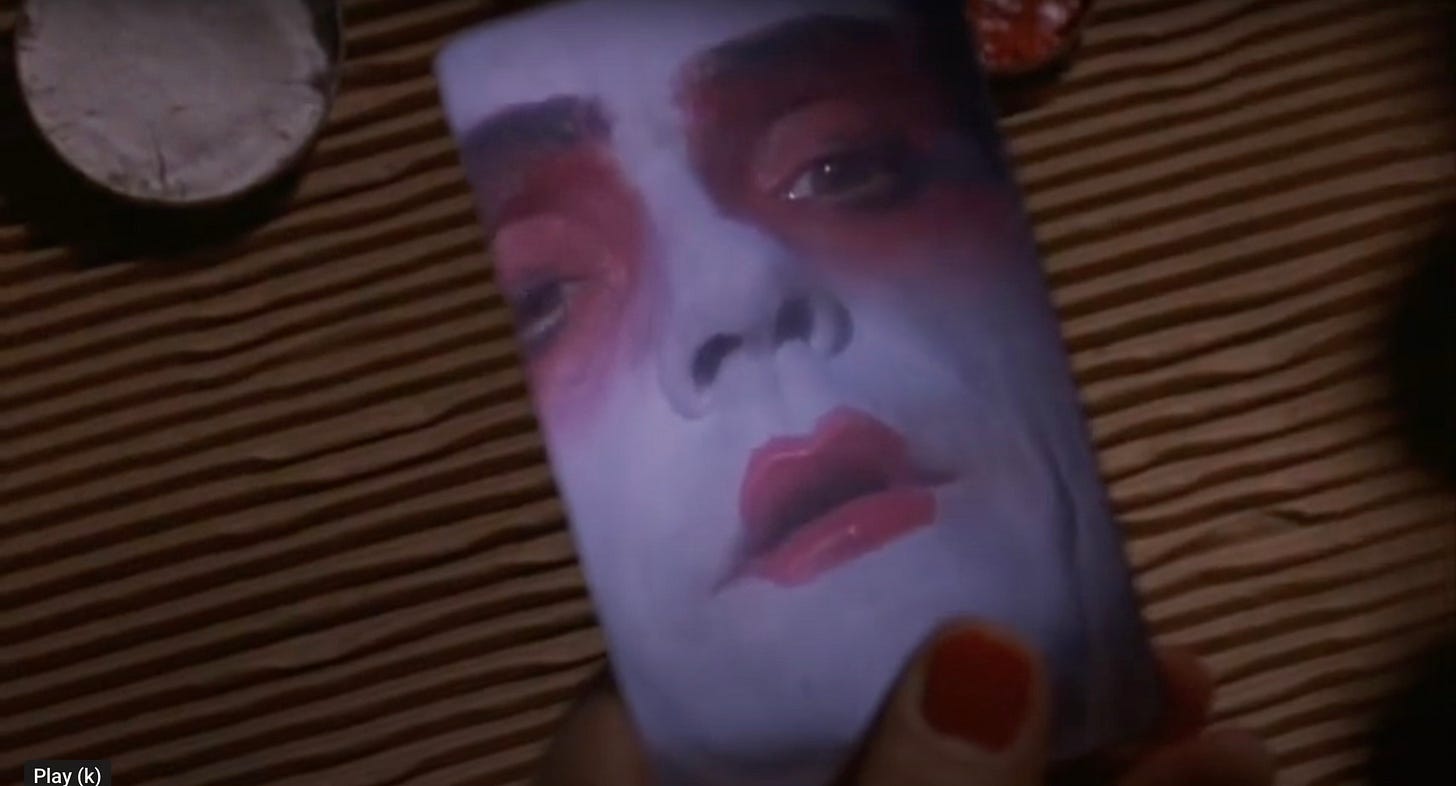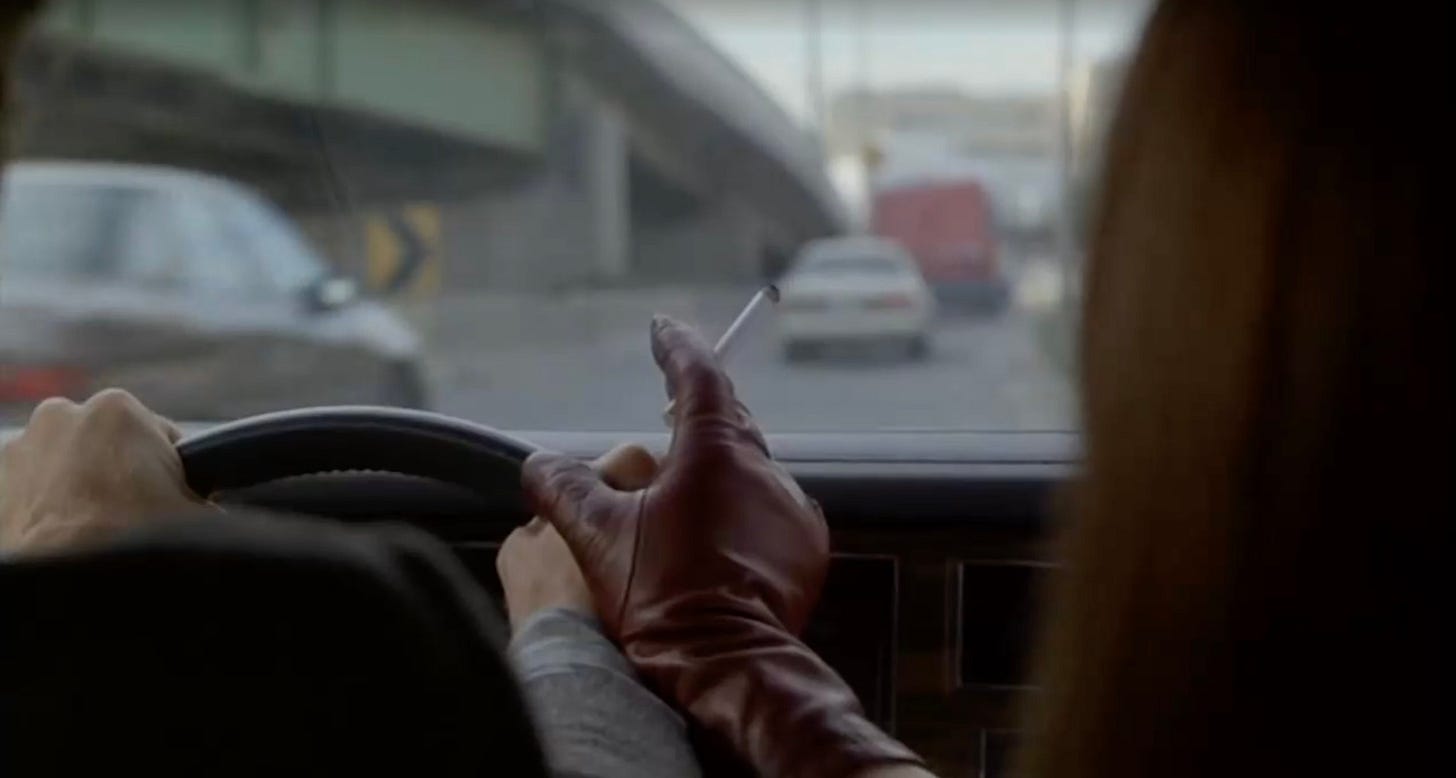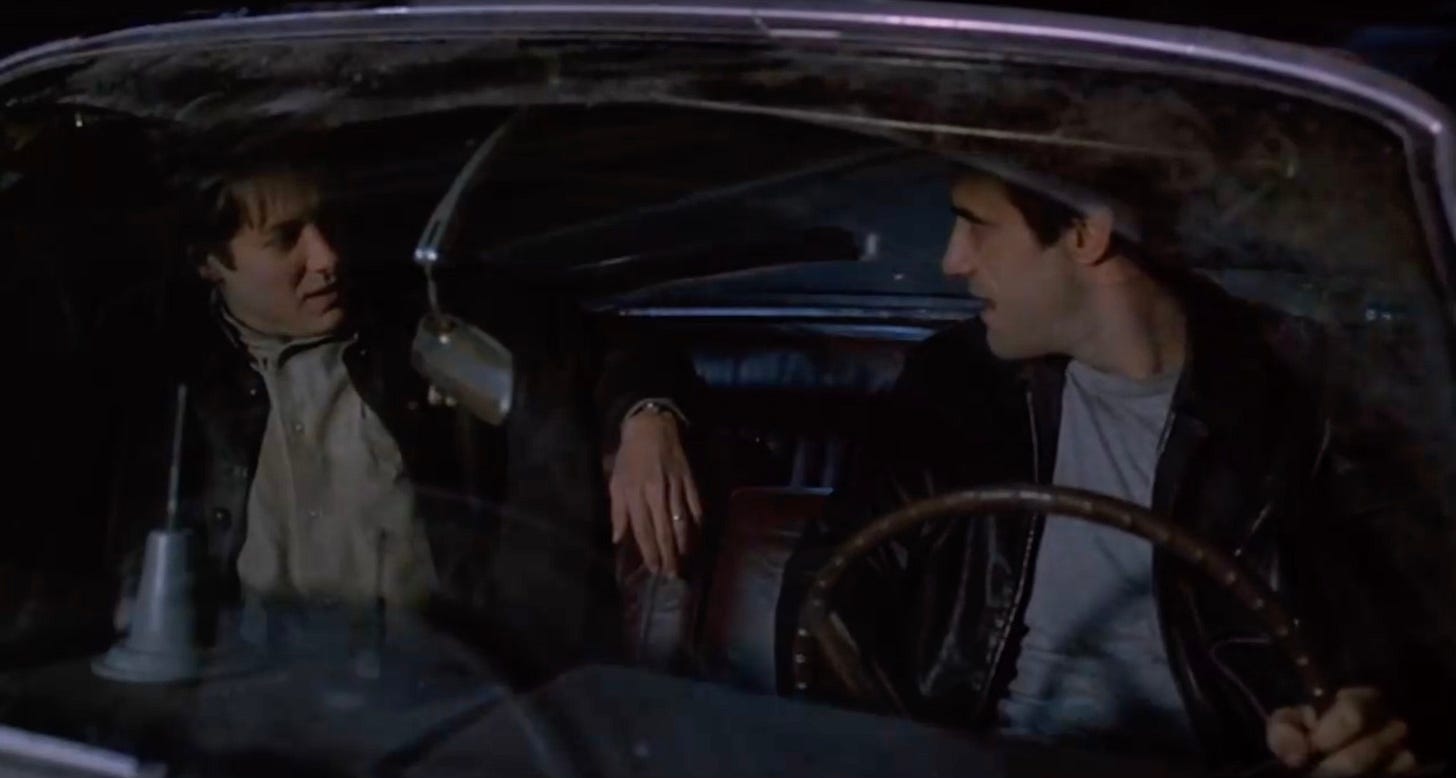Hello again,
It has been some time. Let’s continue to discuss Cronenberg—because why not?
Firstly, Naked Lunch. This is my most watched of his films. Why? I watched it young and returned to reconfirm its strangeness.
Based on William Burroughs's novel, Naked Lunch is about a trip to Interzone, a thinly veiled Tangiers where the heroine is abundant and the typewriters are sentient beetles.
Peter Weller is William Lee, an exterminator addicted to ‘bug powder’ in NYC before accidentally killing his girlfriend while attempting to shoot a drinking glass from her head (something that happened to Burroughs).
Fleeing the police, he is recruited as an ‘Interzone Agent’ to write a report of the grisly death of his wife while in Interzone. The being recruiting him is a man-shaped bug with a prehensile tongue named Mugwump.
Weller’s voice in this film is soaked with cigarette smoke and bourbon. His delivery is slow, and his face is deadpan. His character is ‘sexual ambivalence’ personified: queer but conflicted about it.
Cut to Interzone: mint tea, cigarettes, open-air cafes, typewriter fetishes, longing stares from young men and fencing ‘black meat’ of centipedes (another heroine euphemism).
The plot devolves into drug-addled paranoia as the movie cuts pieces from Burroughs's prose, including a scene where William has a conversation with an anus/beetle.
Burroughs’ original novel was banned in the US for obscenity, which undoubtedly led to some of the novel’s notoriety.
The novel’s reputation as ‘degenerate’ led me to read Burroughs and then to the film adaptation. A part of me searches out the promise of the unknown and the provocative. This world is much broader than some believe, which is interesting.
There is value in differing perspectives. I’m confident some would argue that the perspective of a queer junkie is negligible, but I disagree. Burroughs’ work challenges the status quo.
It challenges the norm. It speaks to the condition of gay and bisexual men. It sexualizes them and challenges the idea of normative sexuality: social constructs judged by society’s current ideals of morality.
Part of me feels that Cronenberg’s Naked Lunch focuses more on the weird than the character’s sexuality, though: the overly large insects masquerading as typewriters, the abundance of drugs, the body horror and the extreme paranoia.
Cronenberg’s story spirals into itself as the plot is sacrificed at the altar of getting progressively stranger.
But, given the source material and the director, can you expect anything less?
More than anything, Naked Lunch makes me feel curious. There is something deeply weird about Cronenberg’s Naked Lunch. It is thrilling to inhabit a world where large insects and exotic drugs mix with extreme paranoia and an undercurrent of sexual longing.
There is nothing else like it that I’ve seen, and I admire it for that.
Next, M. Butterfly, an adaptation of the Broadway play of the same name.
I feel that our society has progressed to the point where this film feels clunky and outdated when it comes to gender identity, gender politics, race, and colonial practices.
That said, let’s talk about it. M. Butterfly is a film based on a true story, in which Rene Gallimard (Jeremy Irons), a French diplomat in China, has an affair and falls in love with a Chinese opera singer, Song Liling (John Lone).
Gallimard is obsessed with Puccini’s opera, Madam Butterfly, in which a US naval officer marries a young Japanese girl and then leaves her. He does, unaware that she is pregnant.
Years later, he returns to Japan with a new wife. The naval officer and his new wife learn of the forgotten child and agree to raise the child together. The officer, seeing the child for the first time, flees—the child’s mother then commits ritual suicide.
It is a dark Opera to obsess about, and Gallimard transfers that dark obsession to Liling, fetishizing a dominant relationship with an Asian woman.
Throughout the movie, Gallimard falls in love with Liling, while his marriage in France falls apart.
With the confidence he finds in his relationship with Liling, he works his way up in the French Embassy, becoming a Consul General.
The relationship continues for twenty years until Gallimard is sentenced for treason and imprisoned, confronted with the fact that Liling is a man in drag who has been spying on him for the Chinese government.
After the trial, Liling visits Gallimard in jail, professing his love for him.
Afraid of what the implications of their relationship mean for him and his sexuality, Gallimard rejects his lover.
While jailed, unable to live with the knowledge that he has spurned his lover, he dresses as a geisha and commits ritual suicide. Gallimard dies like so many of Croenberg’s protagonists.
To hear Cronenberg speak of it, he admits that he was attracted to the themes of identity and transformation and mentions that the film's protagonist knew he was in love with a man but could not admit it.
This movie's fatal flaw is that it centers on Gallimard’s POV. There isn’t much context given to the character of Song Lilong, who serves as an object of fetishization. Song’s story is not explored in depth or with much thought or care. Her side of their love story is empty, unexplored, and secondary.
Gallimard’s concern or doubt about their relationship could have been explored further, showing us, the audience, why he cared for his lover.
M. Butterfly feels clunky, especially in a modern context. It doesn’t address a man living as a woman in any significant way, the way that colonial practices affect their relationship or the complications of two men loving one another in China at that time.
Overall, M. Butterfly is a footnote in Cronenberg’s filmography. The characters, especially Song, felt far from complete and largely unrelatable.
Lastly, let’s talk about Crash.
I remember first hearing of Crash on CBC radio in the mid-90s. I think they were interviewing JG Ballard, the author of the novel Crash, but it could have been Cronenberg, a film critic, or anyone, really. I remember, in my mind’s eye, two people discussing how dangerous the film was.
I made up a scene in my head, one where two people, having crashed their cars into a ditch, intertwined in a sexual embrace. It was nothing more than that, but it sat in my head for thirty years.
I never watched Crash at that time. I never felt the need to watch an erotic film about cars and car crashes. I never watched Crash until last year.
If you’ve seen many of David’s previous films, you understand how he arrived to film Crash. There are always layers of sexuality in his movies. I mean, this isn’t the first movie where his characters sexualize or fetishize technology. Videodrome has someone making out with a television. Dead Ringers has shades of surgical fetishization. The Brood showcases a manufactured virus spread through sexual intercourse. Naked Lunch has typewriter fetishization.
The world of the 90s was quick to dismiss Crash as pornography. I was a teenager at the time. I remember the outright rage that accompanied Crash. There were calls for bans and censorship.
It was a different time in the 90s. Hollywood was producing a lot of erotic thrillers like Fatal Instinct.
Would it be remiss to expect anything less from Cronenberg than to dial the erotic to eleven and add an element of weirdness?
Well, that’s what he did.
James Spader and Holly Hunter were the stars, James playing James Ballard, and Holly playing Dr. Helen Remington.
Spader’s Ballard is awkward, frustrated and searching for sexual satisfaction.
Holly’s Remington provides guidance, a more mature presence, and someone who has already found some answers to her desires. She guides Ballard into the world of erotic car crashes.
James’ character is in an open relationship. His wife, Catherine (Deborah Kara Unger), and he are searching for sexual satisfaction, driving each other forward and using that erotic energy to fuel their sexual relationship.
Like many of Cronenberg’s films, Crash skirts the edge of good taste. He stated that this film is about people searching for something “beyond sexuality, beyond sex, beyond gender.”
I ask myself, ‘why would he make this film,’ and I believe that in and of itself is the reason—because he could, because the film's existence is justification enough, to create art for art's sake, knowing it would cause moral panic.
I’m all for this. Exploration of the human condition and human sexuality through art creates a safe space for those involved, as long as everyone involved in the art is treated safely and humanely in the production of that art.
Here, I believe, that was the case. The cast and crew worked collaboratively to create this film, with much of the main cast working at less than their usual rate because they believed in Cronenberg’s vision.
Naked Lunch’s novel met with bans, and the film road on the coattails of that outrage. With Crash, the film was met with the full barrage of our media’s moral wrath and social panic.
The two central characters meet by crashing into one another and, later, at the hospital while recovering. Then, later, at the scrap yard, where they bond over their fetishization of broken cars before having sex.
The movie opens up when Helen introduces the character of Vaughn (Elias Koteas) to James. Vaughn is five steps ahead in his auto-fixation, involved in recreating crashes, surrounded by groupies who objectify him for this. James steps in line, falling for the charismatic man and pursuing him.
The entirety of the film revolves around accidents, death and sex, culminating in the death of Vaughn, whose car is run off a bridge and falls into a bus. At the movie's end, Catherine crashes, and James follows her into the crash, where they consummate the experience.
Honestly, it’s a movie that defies expectations. It doesn’t have moral boundaries. It is what it is: a movie about cars and sex.
Like so many of Cronenberg’s films, I’m left feeling voyeuristic, a passenger on a trip that I never expected to be on. Crash doesn’t necessarily appeal to me, but it impacted me. The mere fact that this movie exists is a testament to Cronenberg’s ability to create outside the limits of typical filmmakers, and I admire him for that.
These three movies, Naked Lunch, M. Butterfly, and Crash, swerved from Cronenberg’s science fiction and horror roots to explore themes of eroticism, sex, and identity. While not always successful, I admire him for his commitment to exploring sexuality, accepting kinks, and showcasing queer relationships, even while some of this may feel outdated in a modern context.
I respect someone willing to risk scorn and hatred with their art. Cronenberg’s bravery, authenticity, and artistic license are challenging to find in a field where merit is judged by dollars earned.
Next, we’ll talk about eXistenz, Spider, and Eastern Promises.
Thanks for reading,
Martin





